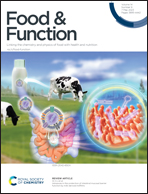20S-Protopanaxatriol improves cognitive function of Alzheimer's disease by promoting endogenous neurogenesis†
Abstract
Neurogenesis in Alzheimer's disease (AD) is impaired, and thus promoting neurogenesis is a promising strategy for treating AD-related cognition impairment. Here, we found that 20S-protopanaxatriol (PPT) can alleviate cognitive deficits in an AlCl3-induced AD zebrafish model in Y and T maze tests and increase the HUC expression of the telencephalon. PPT promotes neural stem cell (NSC) line differentiation into neurons under AD condition. PPT significantly alleviated the apoptosis and cell cycle arrest of NSCs induced by amyloid-beta. Next, we investigated the molecular mechanism of PPT in treating AD by network pharmacology and molecular docking. PPT could target PIK3CA and PI3K/AKT signaling pathways. PPT significantly reversed the reduced expression level of PIK3CA (PI3K p110), p-PI3Kp85 and p-AKT of NSCs under AD condition. These results suggested that PPT alleviated the cognitive dysfunction of AD and promoted NSC proliferation and neurogenesis through the PI3K/AKT pathway. Therefore, PPT might be a potential candidate to treat AD-related cognitive decline via enhancing endogenous neurogenesis.



 Please wait while we load your content...
Please wait while we load your content...